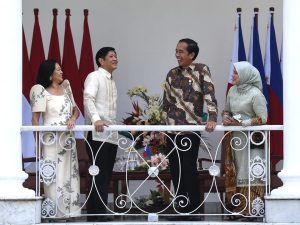After an exhaustive guessing game about the destination of the first official overseas visit of President Ferdinand “Bongbong” Marcos Jr., with many posing a rigid choice between Beijing or Washington, the Filipino leader bestowed this privilege on Indonesia, which he visited this week. The choice followed a recent tradition in which Philippine presidents use their inaugural overseas visit to recognize the importance of Southeast Asia.
Indonesia is important as the de facto leader of the Association of Southeast Asian Nations (ASEAN), which Marcos’ father helped found in 1967. But as the two emerging middle powers in maritime Southeast Asia, the Philippines and Indonesia also share several non-traditional security concerns, including climate change, terrorism, and economic recovery from the COVID-19 pandemic amid the Russia-Ukraine war and the boiling tension in the Taiwan Strait. In the contested South China Sea, there are overlapping territorial and maritime claims by China, Taiwan, and several Southeast Asian countries, all of which (bar Brunei) maintain troops on the features that they occupy.
The geopolitical importance of maritime Southeast Asia, which is jointly inhabited by Indonesia and the Philippines, lies in the fact that the region straddles the busiest sea lanes in the world, running between the Indian Ocean and Pacific Ocean. Half of the world’s shipping passes through Southeast Asia, making the seas and the straits of the region fundamental to its – and the world’s – maritime security.
Under the new Marcosian regime, the Philippines will most likely continue to deepen its strategic relationship with Indonesia. Relations between the two nations have expanded apace since the two nations established diplomatic ties on November 24, 1949. In the more than seventy years since, Manila and Jakarta have signed more than 20 bilateral defense and security agreements, the most between any two ASEAN member states.
The brotherhood of the two archipelagic Southeast Asian states, which have no outstanding territorial disputes, unlike the Philippines and Malaysia, elevates the relationship to a state not far short of a treaty alliance. That the Philippines continues to view Indonesia as a strategic partner has been made clear by its proposal to sign a Status of Visiting Forces Agreement (SOVFA) with Jakarta. Modeled on the agreement that it signed with Australia in 2012, a SOVFA would govern the conduct of Indonesian troops deployed in the Philippines. Pursuing a SOVFA with Indonesia would help bind the strategic partnerships between two of the world’s largest archipelagic nations.
Marcos could also expand the Philippines’ procurement from Indonesia’s indigenous defense industry, in order to bolster the country’s foreign policy independence and prevent its overreliance on any one supplier. This can be realized if Manila expedites the designation of the Philippines’ archipelagic sea lanes as maritime zones and facilitates the interoperability of the Philippine and Indonesian coast watch systems.
Given that Manila already enjoys a mature relationship with Jakarta, Marcos’ visit to Indonesia should open the doors to the development of the Philippines’ defense capability and the enhancement of the capacity and competency of its personnel. By resetting the diplomatic channels of the Philippines and Indonesia under the Marcos and Jokowi regimes, both leaders can address current and emerging threats through military modernization, in particular, by starting to improve the capabilities of their defense industries, in pursuit of regional security and resiliency.
By addressing regional ocean governance, Indonesia and the Philippines can promote regional maritime cooperation in the wider Indo-Pacific region and help establish maritime rules-based norms and the interoperability of various navies in cross-border and multilateral maritime operations. Lastly, this will also address backdoor corridor issues in maritime Southeast Asia, and help strengthen the maritime interagency structure covering Mindanao in the southern Philippines and North Sulawesi in Indonesia, a corridor that has long been plagued by a range of non-traditional security threats. Insecurities in the Sulu-Sulawesi seas prescribe tight borders and more holistic approaches to addressing minilateral mechanisms pertaining to security, peace and development, and mutual defense agreements.
As the world enters a multipolar era and the Indonesian economy continues to grow, Manila should seize the opportunity to seek out high-level consultations in order to advance the two nations’ mutual interests.

































